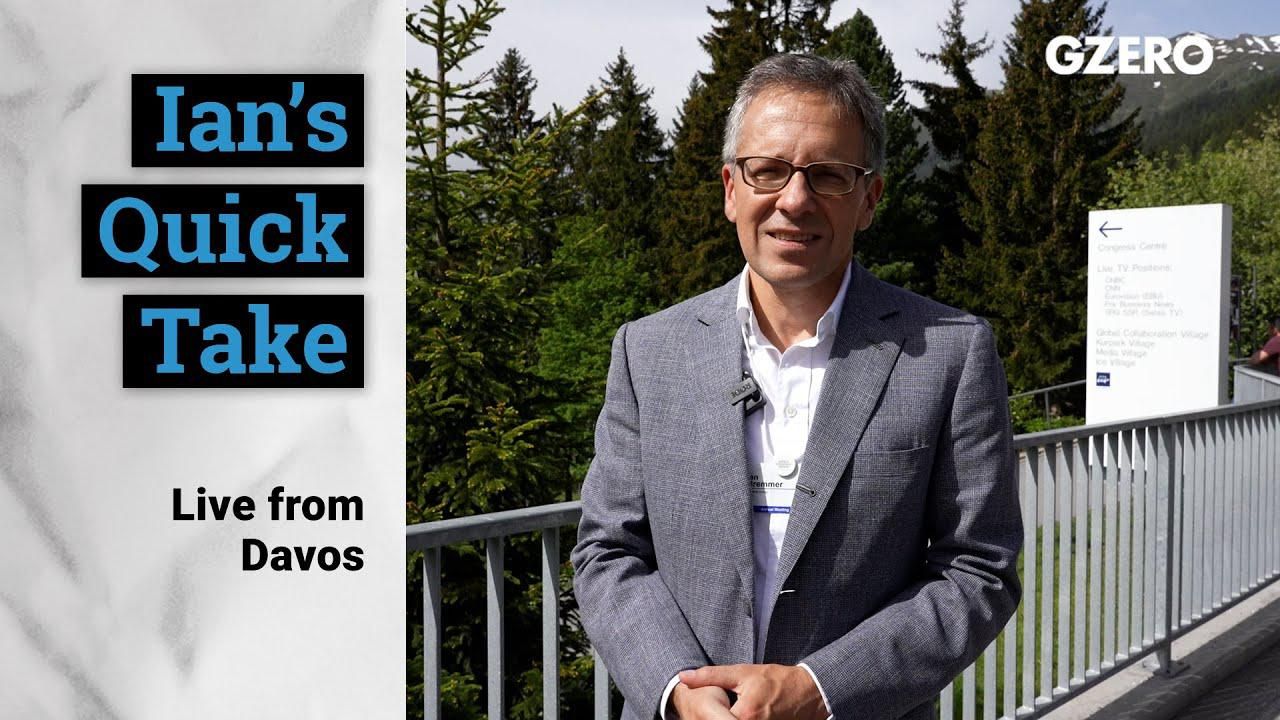Quick Take
"Crisis-rich" WEF 2022: on ending war in Ukraine & redistributing wealth

Ian Bremmer: Live from Davos | World Economic Forum 2022 | Quick Take | GZERO Media

Ian Bremmer's Quick Take: Hey everybody, Ian Bremmer here, and I'm in Davos, Switzerland for the World Economic Forum. It is springtime. It's not the way it's supposed to work, but it is the first live forum in person since the pandemic hit. I'd say it's pretty well attended. About 80% of the folks you would normally expect to see here, almost all the CEOs, a lot of heads of state, government delegations, and of course, a lot of public intellectuals, but who you're not seeing, there's not one Russian in attendance. No corporates, no governments, no delegates. And that is because of the invasion into Ukraine three months ago. They were removed from the agenda. There's a lot being talked about right now.
This is certainly the most crisis rich environment that you've ever seen in a World Economic Forum. I think that's because you're in a geopolitical recession where the global institutions are increasingly misaligned with the power balance in the world, and that creates more crises. Everyone's worried about it. How are you going to respond to them? How do you respond to the Russian invasion in Ukraine? There's a lot of unity around the Russian invasion of Ukraine. Everyone here is on one side of it. Everyone thinks it's basically a war crime, they need to be stopped. There's no question there, but how do you end it? There's a lot of question of can the Ukrainians win? What does that mean? Is there need to be an off ramp for the Russians? What does that mean? No agreement on that whatsoever. I mean, I would say that the pessimistic view is the fighting continues. The more optimistic view is the fighting can stop, but it's still a very unstable equilibrium. I'm in the latter camp, but that still makes you feel like you're in a cold war. You're in a decoupled environment. It is not what this organization has been most committed to for 50 years, which is globalization. How can you talk about globalization when a G20 country has just been completely cut off from the G7 right in the middle of Europe?
Otherwise globalization conversations continue apace. It's still about data and goods and services and ideas and people moving faster and faster all over the world, except that over the course of the last couple of years, the big trend out there, leave aside all of these perfusion of crises, is that the global middle class, which had been growing for 50 years, is increasingly diminishing and it's splitting up. Part of that is the response to the pandemic and the fact that it hit the middle income the hardest. Emerging markets, developing states around the world didn't have the vaccines. They didn't have the economic capacity to respond very sharply. Same thing. So you didn't get the V-shaped recovery that you got in the United States, for example, you certainly got in China. On top of that, with a Russia-Ukraine war, who's taking it the hardest in terms of all of this inflation for commodities and especially food and fertilizer? Same thing, a global middle class.
So if the hope from 50 years of world economic forum is that you just weren't going to enrich multinational corporations and global elites, but that the global middle class was going to be fully on board, you're now seeing an unwind of that, and that's a very disturbing situation and backdrop for how you keep globalization going. Massive redistribution is going to be needed. If you had redistribution of labor from the wealthy countries to the middle income countries over the last 50 years, which balanced the world to a degree, and created a lot of discontent in the wealthy countries, it's now talking about a redistribution of capital. The only problem is nobody in the rich countries are really willing to do that to anybody but Ukraine these days. Anyway, that's a little bit of a take, a little flavor from what we're seeing in the World Economic Forum right now. Try to talk to you over the course of the week. Hope everyone's doing well.
For more of Ian Bremmer's weekly analyses, subscribe to his GZERO World newsletter at ianbremmer.bulletin.comIn this "ask ian," Ian Bremmer analyzes Trump’s recent meeting with Zelensky and how close (or far) Russia and Ukraine are from a peace deal.
Syrian President Ahmed al-Sharaa attends the military parade of the Syrian army in Umayyad Square in central Damascus to mark the one-year anniversary of the fall of the Assad regime, on Dec. 8, 2025.
A year ago this month, Syria’s brutal dictatorship collapsed. There are signs of recovery, but sectarian violence threatens to undermine the optimism.